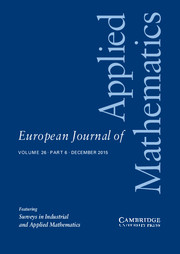Crossref Citations
This article has been cited by the following publications. This list is generated based on data provided by
Crossref.
Liu, Li
and
Weng, Peixuan
2015.
A nonlocal diffusion model of a single species with age structure.
Journal of Mathematical Analysis and Applications,
Vol. 432,
Issue. 1,
p.
38.
Weng, Peixuan
and
Liu, Li
2017.
Globally Asymptotic Stability of a Delayed Integro-Differential Equation With Nonlocal Diffusion.
Canadian Mathematical Bulletin,
Vol. 60,
Issue. 2,
p.
436.
Pan, Shuxia
and
Shi, Hong-Bo
2018.
Minimal wave speed of competitive lattice dynamical systems with delays.
Advances in Difference Equations,
Vol. 2018,
Issue. 1,
Weng, Peixuan
Liu, Li
and
Xu, Zhaoquan
2018.
Monotonicity, asymptotic behaviors and uniqueness of traveling waves to a nonlocal dispersal equation modeling an age-structured population.
Nonlinear Analysis: Real World Applications,
Vol. 39,
Issue. ,
p.
58.
Kyrychko, Y. N.
and
Schwartz, I. B.
2018.
Enhancing noise-induced switching times in systems with distributed delays.
Chaos: An Interdisciplinary Journal of Nonlinear Science,
Vol. 28,
Issue. 6,
Zhang, Liang
Wang, Zhi-Cheng
and
Zhao, Xiao-Qiang
2019.
Propagation dynamics of a time periodic and delayed reaction-diffusion model without quasi-monotonicity.
Transactions of the American Mathematical Society,
Vol. 372,
Issue. 3,
p.
1751.
Su, Tao
and
Zhang, Guobao
2020.
Invasion Traveling Waves for a Discrete Diffusive Ratio-Dependent Predator-Prey Model.
Acta Mathematica Scientia,
Vol. 40,
Issue. 5,
p.
1459.
Liu, Li
and
Weng, Peixuan
2020.
Spreading speed for a nonlocal diffusive delayed model without quasi-monotonicity.
Journal of Mathematical Analysis and Applications,
Vol. 482,
Issue. 2,
p.
123498.
Aye, Thazin
Fang, Jian
and
Pan, Yingli
2020.
On a population model in discrete periodic habitat. I. Spreading speed and optimal dispersal strategy.
Journal of Differential Equations,
Vol. 269,
Issue. 11,
p.
9653.
Zhang, Ran
Wang, Jinliang
and
Liu, Shengqiang
2021.
Traveling Wave Solutions for a Class of Discrete Diffusive SIR Epidemic Model.
Journal of Nonlinear Science,
Vol. 31,
Issue. 1,
Zhang, Ran
and
Yu, Xiaoqing
2022.
Traveling waves for a four‐compartment lattice epidemic system with exposed class and standard incidence.
Mathematical Methods in the Applied Sciences,
Vol. 45,
Issue. 1,
p.
113.
Zhang, Ran
Li, Dan
and
Sun, Hongquan
2023.
Traveling wave solutions for a discrete diffusive epidemic model with asymptomatic carriers.
International Journal of Biomathematics,
Vol. 16,
Issue. 02,
Wei, Jingdong
Li, Jiahe
and
Zhou, Jiangbo
2024.
Boundedness of Traveling Waves in a Discrete Diffusion Model with Delay.
Qualitative Theory of Dynamical Systems,
Vol. 23,
Issue. 1,
Aye, Thazin
Fang, Jian
and
Pan, Yingli
2024.
On a Population Model in Discrete Periodic Habitat. II. Bistable Pulsating Waves and Propagation Direction.
Journal of Nonlinear Science,
Vol. 34,
Issue. 4,
He, Juan
Zhang, Guo-Bao
and
Liu, Ting
2024.
Propagation dynamics of a mutualistic model of mistletoes and birds with nonlocal dispersal.
European Journal of Applied Mathematics,
Vol. 35,
Issue. 4,
p.
533.
Yang, Peng
2026.
Traveling wave solutions in a discrete diffusive epidemic model with stage structure and nonlinear incidence rate.
Journal of Mathematical Analysis and Applications,
Vol. 555,
Issue. 1,
p.
130027.

